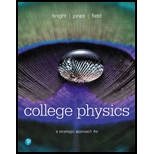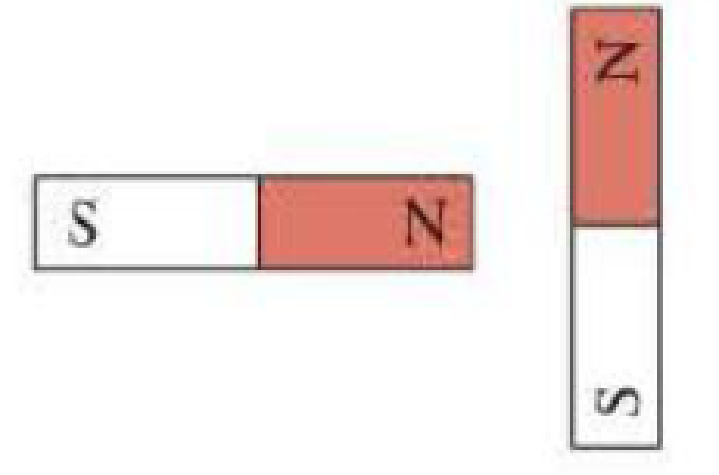
Concept explainers
In Figure Q24.1, suppose the magnet on the right is fixed in place and the magnet on the left is free to pivot about its center. Will the magnet on the left start to rotate? If so, will it initially rotate clockwise or counterclockwise?
Figure Q24.1

To check: the left side magnet’s rotation and find the initial rotating direction of this magnet.
Answer to Problem 1CQ
The left side magnet starts rotating and it is rotating in the direction of clockwise.
Explanation of Solution
Given data:
Refer Figure Q24.1 in the textbook for two magnet arrangement.
Consider that the north pole of the magnet is expressed as “N” and the south pole of the magnet is expressed as “S”.
Explanation:
Consider the same poles of magnets repel each other and opposite poles of magnets attract each other.
The magnet, which is placed in the left side, will rotate in direction of clockwise because two N poles of the two magnets repel each other and the N pole of left magnet gets attracted by the S pole of right magnet. Then, the left magnet’s S pole is attracted to the N pole of the fixed magnet.
Therefore, the left magnet gets rotating due to opposite poles attraction and same poles repel.
Conclusion:
Thus, the left side magnet starts rotating and it is rotating in the direction of clockwise.
Want to see more full solutions like this?
Chapter 24 Solutions
College Physics: A Strategic Approach Plus Mastering Physics with Pearson eText -- Access Card Package (4th Edition) (What's New in Astronomy & Physics)
Additional Science Textbook Solutions
Cosmic Perspective Fundamentals
Physics for Scientists and Engineers: A Strategic Approach, Vol. 1 (Chs 1-21) (4th Edition)
Introductory Chemistry (6th Edition)
Biology: Life on Earth (11th Edition)
Campbell Essential Biology (7th Edition)
Applications and Investigations in Earth Science (9th Edition)
- A block of mass m = 2.50 kg is pushed d = 2.30 m along a frictionless horizontal table by a constant applied force of magnitude F = 10.0 N directed at an angle 25.0° below the horizontal as shown in the figure below. m (a) Determine the work done by the applied force. ] (b) Determine the work done by the normal force exerted by the table. ] (c) Determine the work done by the force of gravity. ] (d) Determine the work done by the net force on the block. ]arrow_forwardA man pushing a crate of mass m = 92.0 kg at a speed of v = 0.845 m/s encounters a rough horizontal surface of length = 0.65 m as in the figure below. If the coefficient of kinetic friction between the crate and rough surface is 0.357 and he exerts a constant horizontal force of 294 N on the crate. e (a) Find the magnitude and direction of the net force on the crate while it is on the rough surface. magnitude direction ---Select--- N (b) Find the net work done on the crate while it is on the rough surface. ] (c) Find the speed of the crate when it reaches the end of the rough surface. m/sarrow_forwardTwo blocks, A and B (with mass 45 kg and 120 kg, respectively), are connected by a string, as shown in the figure below. The pulley is frictionless and of negligible mass. The coefficient of kinetic friction between block A and the incline is μk = 0.26. Determine the change in the kinetic energy of block A as it moves from to, a distance of 15 m up the incline (and block B drops downward a distance of 15 m) if the system starts from rest. × J 37° Barrow_forward
- You are working for the Highway Department. In mountainous regions, highways sometimes include a runaway truck ramp, and you are asked to help with the design of such a ramp. A runaway truck ramp is often a lane of gravel adjacent to a long downhill section of roadway where trucks with failing brakes may need assistance to stop. Working with your supervisor, you develop a worst-case scenario: a truck with a mass of 6.00 × 104 kg enters a runaway truck lane traveling at 34.1 m/s. Assume that the maximum constant value for safe acceleration of the truck is -5.00 m/s². Any higher magnitude of acceleration increases the likelihood that semi-trailer rigs could jackknife. Your supervisor asks you to advise her on the required length (in m) of a runaway truck lane on a flat section of ground next to the roadway. marrow_forwardA large cruise ship of mass 6.20 × 107 kg has a speed of 10.2 m/s at some instant. (a) What is the ship's kinetic energy at this time? ] (b) How much work is required to stop it? (Give the work done on the ship. Include the sign of the value in your answer.) ] (c) What is the magnitude of the constant force required to stop it as it undergoes a displacement of 3.10 km? Narrow_forwardA 7.80 g bullet is initially moving at 660 m/s just before it penetrates a block of wood to a depth of 6.20 cm. (a) What is the magnitude of the average frictional force (in N) that is exerted on the bullet while it is moving through the block of wood? Use work and energy considerations to obtain your answer. N (b) Assuming the frictional force is constant, how much time (in s) elapses between the moment the bullet enters the block of wood and the moment it stops moving? Sarrow_forward
- Please don't use Chatgpt will upvote and give handwritten solutionarrow_forwardTwo blocks, A and B (with mass 45 kg and 120 kg, respectively), are connected by a string, as shown in the figure below. The pulley is frictionless and of negligible mass. The coefficient of kinetic friction between block A and the incline is μk = 0.26. Determine the change in the kinetic energy of block A as it moves from to ①, a distance of 15 m up the incline (and block B drops downward a distance of 15 m) if the system starts from rest. ] 37° A © Barrow_forwardA skateboarder with his board can be modeled as a particle of mass 80.0 kg, located at his center of mass. As shown in the figure below, the skateboarder starts from rest in a crouching position at one lip of a half-pipe (point). On his descent, the skateboarder moves without friction so that his center of mass moves through one quarter of a circle of radius 6.20 m. i (a) Find his speed at the bottom of the half-pipe (point Ⓡ). m/s (b) Immediately after passing point Ⓑ, he stands up and raises his arms, lifting his center of mass and essentially "pumping" energy into the system. Next, the skateboarder glides upward with his center of mass moving in a quarter circle of radius 5.71 m, reaching point D. As he passes through point ①, the speed of the skateboarder is 5.37 m/s. How much chemical potential energy in the body of the skateboarder was converted to mechanical energy when he stood up at point Ⓑ? ] (c) How high above point ① does he rise? marrow_forward
- A 31.0-kg child on a 3.00-m-long swing is released from rest when the ropes of the swing make an angle of 29.0° with the vertical. (a) Neglecting friction, find the child's speed at the lowest position. m/s (b) If the actual speed of the child at the lowest position is 2.40 m/s, what is the mechanical energy lost due to friction? ]arrow_forwardA force acting on a particle moving in the xy plane is given by F = (2yî + x²), where F is in newtons and x and y are in meters. The particle moves from the origin to a final position having coordinates x = 5.60 m and y = 5.60 m, as shown in the figure below. y (m) B (x, y) x (m) (a) Calculate the work done by F on the particle as it moves along the purple path (0 Ⓐ©). ] (b) Calculate the work done by ♬ on the particle as it moves along the red path (0 BC). J (c) Is F conservative or nonconservative? ○ conservative nonconservativearrow_forwardA 3.5-kg block is pushed 2.9 m up a vertical wall with constant speed by a constant force of magnitude F applied at an angle of 0 = 30° with the horizontal, as shown in the figure below. If the coefficient of kinetic friction between block and wall is 0.30, determine the following. (a) the work done by F J (b) the work done by the force of gravity ] (c) the work done by the normal force between block and wall J (d) By how much does the gravitational potential energy increase during the block's motion? ]arrow_forward
 College PhysicsPhysicsISBN:9781305952300Author:Raymond A. Serway, Chris VuillePublisher:Cengage Learning
College PhysicsPhysicsISBN:9781305952300Author:Raymond A. Serway, Chris VuillePublisher:Cengage Learning College PhysicsPhysicsISBN:9781285737027Author:Raymond A. Serway, Chris VuillePublisher:Cengage Learning
College PhysicsPhysicsISBN:9781285737027Author:Raymond A. Serway, Chris VuillePublisher:Cengage Learning Principles of Physics: A Calculus-Based TextPhysicsISBN:9781133104261Author:Raymond A. Serway, John W. JewettPublisher:Cengage Learning
Principles of Physics: A Calculus-Based TextPhysicsISBN:9781133104261Author:Raymond A. Serway, John W. JewettPublisher:Cengage Learning
 Physics for Scientists and Engineers, Technology ...PhysicsISBN:9781305116399Author:Raymond A. Serway, John W. JewettPublisher:Cengage Learning
Physics for Scientists and Engineers, Technology ...PhysicsISBN:9781305116399Author:Raymond A. Serway, John W. JewettPublisher:Cengage Learning Physics for Scientists and Engineers: Foundations...PhysicsISBN:9781133939146Author:Katz, Debora M.Publisher:Cengage Learning
Physics for Scientists and Engineers: Foundations...PhysicsISBN:9781133939146Author:Katz, Debora M.Publisher:Cengage Learning





